英语Unit2笔记整理
七年级上册英语笔记第二单元
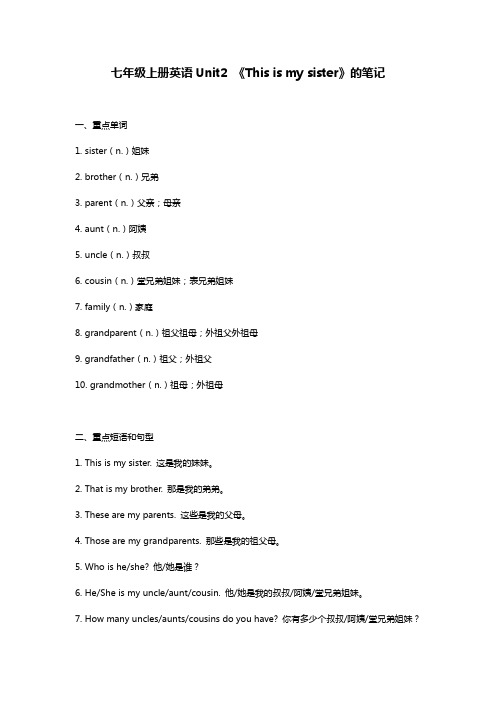
七年级上册英语Unit2 《This is my sister》的笔记一、重点单词1. sister(n.)姐妹2. brother(n.)兄弟3. parent(n.)父亲;母亲4. aunt(n.)阿姨5. uncle(n.)叔叔6. cousin(n.)堂兄弟姐妹;表兄弟姐妹7. family(n.)家庭8. grandparent(n.)祖父祖母;外祖父外祖母9. grandfather(n.)祖父;外祖父10. grandmother(n.)祖母;外祖母二、重点短语和句型1. This is my sister. 这是我的妹妹。
2. That is my brother. 那是我的弟弟。
3. These are my parents. 这些是我的父母。
4. Those are my grandparents. 那些是我的祖父母。
5. Who is he/she? 他/她是谁?6. He/She is my uncle/aunt/cousin. 他/她是我的叔叔/阿姨/堂兄弟姐妹。
7. How many uncles/aunts/cousins do you have? 你有多少个叔叔/阿姨/堂兄弟姐妹?8. I have two uncles/two aunts/two cousins. 我有两个叔叔/两个阿姨/两个堂兄弟姐妹。
9. My family is big. 我家很大。
10. My family is small. 我家很小。
三、重点语法1. 介绍人物的基本句型:This/That is + 人称代词+姓名;These/Those are + 人称代词+姓名。
如:This is my sister, Lily./Those are my grandparents, Mr and Mrs Smith.2. 关于家庭的提问和回答:How many uncles do you have?你有多少个叔叔?I have two uncles./One uncle and one aunt./No uncles./Only one uncle./No uncles and no aunts./Only one aunt./One uncle and one aunt./No aunts./Only one aunt and no uncles./No aunts and no uncles.四、重点词汇辨析1. brother和sister是家庭成员的称呼,其中brother表示“兄弟”,sister表示“姐妹”。
人教版英语九年级全一册unit2笔记
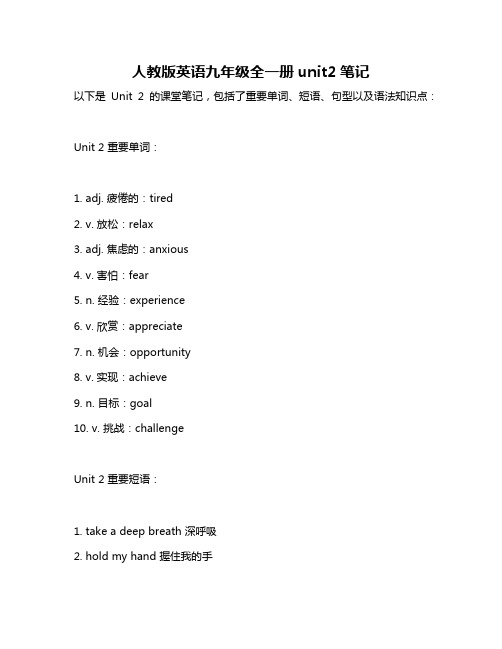
人教版英语九年级全一册unit2笔记以下是Unit 2的课堂笔记,包括了重要单词、短语、句型以及语法知识点:Unit 2 重要单词:1. adj. 疲倦的:tired2. v. 放松:relax3. adj. 焦虑的:anxious4. v. 害怕:fear5. n. 经验:experience6. v. 欣赏:appreciate7. n. 机会:opportunity8. v. 实现:achieve9. n. 目标:goal10. v. 挑战:challengeUnit 2 重要短语:1. take a deep breath 深呼吸2. hold my hand 握住我的手3. calm down 冷静下来4. get butterflies in my stomach 心头鹿撞5. worry about 为...担心6. be nervous about 对...感到紧张7. be anxious about 对...感到焦虑8. be scared of 对...感到害怕9. look forward to 盼望,期待10. in the future 在未来Unit 2 重要句型:1. I feel tired these days. (现在时态,描述当前状态)2. I was really nervous before the big speech. (过去时态,描述过去发生的动作)3. I will challenge myself to do things I didn't think I could do before. (将来时态,描述将来的动作)4. It's important to learn how to deal with stress. (形式主语,强调某事的重要性)5. I look forward to hearing from you. (固定句型,表示期待)6. I have a goal to achieve. (动词不定式作后置定语,表示目标)7. It's a waste of time doing sth. (动名词作主语,表示某事是浪费时间)8. I'm sorry to hear that you're feeling down. (固定句型,表示同情或安慰)9. The best way to relax is through exercise. (动词不定式作后置定语,表示放松的最好方式)10. I will try my best to get the job. (动词不定式作目的状语,表示努力) Unit 2 语法知识点:1. 现在完成时态(Present Perfect Tense):用于描述过去发生的动作对现在的影响或结果。
英语Unit2笔记整理
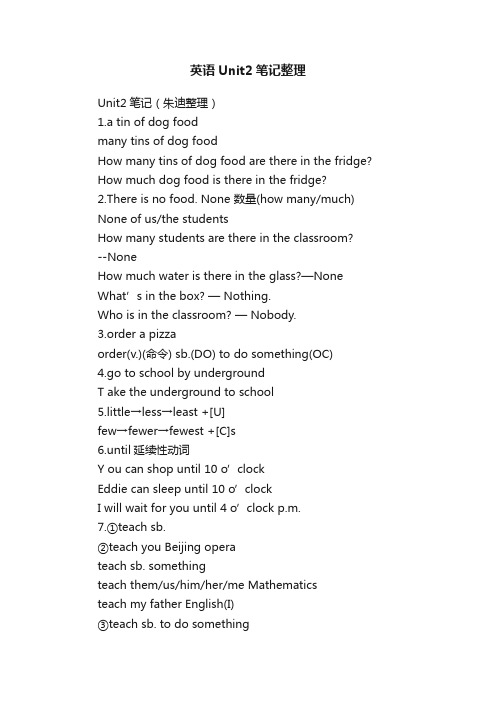
英语Unit2笔记整理Unit2笔记(朱迪整理)1.a tin of dog foodmany tins of dog foodHow many tins of dog food are there in the fridge? How much dog food is there in the fridge?2.There is no food. None 数量(how many/much) None of us/the studentsHow many students are there in the classroom?--NoneHow much water is there in the glass?—None What’s in the box? — Nothing.Who is in the classroom? — Nobody.3.order a pizzaorder(v.)(命令) sb.(DO) to do something(OC)4.go to school by undergroundT ake the underground to school5.little→less→least +[U]few→fewer→fewest +[C]s6.until延续性动词Y ou can shop until 10 o’clockEddie can sleep until 10 o’clockI will wait for you until 4 o’clock p.m.7.①teach sb.②teach you Beijing operateach sb. somethingteach them/us/him/her/me Mathematicsteach my father English(I)③teach sb. to do somethingCan teach me to swim?④teach sb. how to do somethingCan you teach me how to make cakes?8.It’s+time+f rom A to B +transportIt’s twenty minutes from my home to my school on foot.How long is it from my home to my school on foot?How far is it from my hone to my school on foot? It’s twenty minutes’ walk from my home tomy school.It’s +路程+ from A to B.It’s + distance + from A to B.It takes sb. time + to do something.It takes me twenty minutes to walkfrom…to….How long does it take me to walkfrom…to…?It’s three hours from Beijing to Shanghaiby plane/air.①How long is it from Beijing to Shanghaiby plane/air?②How far is it from Beijing to Shanghai byplane/air?It takes three hours to take a plane fromBeijing to Shanghai.It’s ten minutes from the centre of the cityto my home by bike.It’s ten minutes’ ride from the centre of thecity to my home.How far is it from the centre of the city tomy home?It takes me ten minutes to ride a bike fromthe centre of the city to my home.9.There be + more/least/fewer + n. + sp.than + sp.There is more land in Shanghai than in Changzhou.There are fewer people in Shanghai thanin Shanghai.There are fewer books in our library thanin their library.There is less water in the bottle than inthat bottle.10.most ①pron.不定代词most of usmost of the students/souvenirs②adj. +名词most buildingspron. Most of the water in the river isdirty.11.don’t have/need to do something=needn’t 不需要Y ou don’t have to take the umbrella with you.Y ou needn’t take the umbrella with you.Y ou needn’t cross the road to go to the post office. have to do something 客观He has to do so much work.Her son is ill/sick. She has to look after him.must 主观I want to get high works. I must work hard.Must I finish all the work now?--Y es, you must./No, you needn’t/don’t have to.12.(2)until 直到…为止①prep + timeMy mother always shops until 9:00 at night on Sundays.He works until eight o’clock in the office every day.I will stay here until noon.not…until 直到…才I can’t play basketball until five p.m. Sandy won’t arrive until 6:00.I didn’t go to bed until 10 last night.Eddie doesn’t do his homewor k until 7:00 yesterday evening.②conj.I will wait for you(主将)until you come here.(从现)They won’t go home until their parents take them home.They didn’t go home(主过) until they finished cleaning the class(从过).I can’t play outside until I finish my homework.13.look for findHe looked for a job, at least he found a well-paid job.14.A is + time + away from B + transport. It’s fifteen minutes away from my school by bus.My home is two kilometres away from my schoolHer dog Eddie is sick/ill.15.sick/illa sick dogan ill dog ill作定语,意思是品行不良的。
译林版六年级下册英语unit2课堂笔记
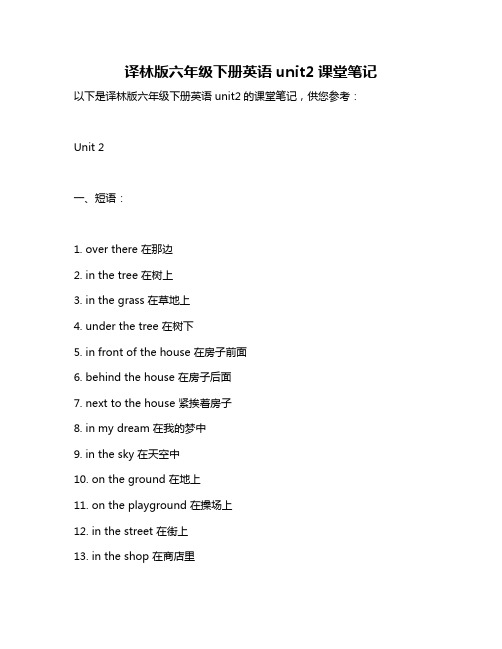
译林版六年级下册英语unit2课堂笔记以下是译林版六年级下册英语unit2的课堂笔记,供您参考:Unit 2一、短语:1. over there 在那边2. in the tree 在树上3. in the grass 在草地上4. under the tree 在树下5. in front of the house 在房子前面6. behind the house 在房子后面7. next to the house 紧挨着房子8. in my dream 在我的梦中9. in the sky 在天空中10. on the ground 在地上11. on the playground 在操场上12. in the street 在街上13. in the shop 在商店里14. in the supermarket 在超市里15. in the museum 在博物馆里16. at the bus stop 在公交车站17. at the train station 在火车站18. at the airport 在机场19. in the countryside 在乡下20. in the mountains 在山里21. in the sea 在海里22. in the sky 在空中23. in space 在太空中24. at night 在晚上25. in the morning 在早上26. in the afternoon 在下午27. at noon 在中午28. last night 昨晚29. this morning 今天早上30. this afternoon 今天下午31. this evening 今天晚上32. yesterday 昨天33. today 今天34. now 现在35. before 在……之前36. after 在……之后37. with 和……一起,用……(表方法)38. with a pen 用一支钢笔(表工具)39. with my friends 和我的朋友们(表伴随)40. with a smile 带着微笑(表伴随)。
初一英语unit2笔记
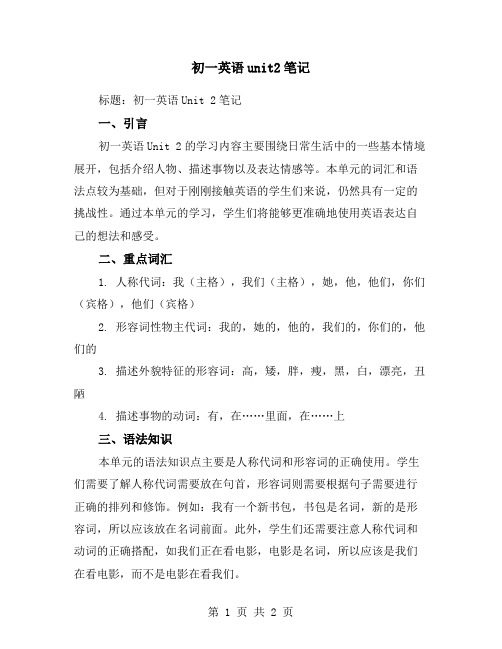
初一英语unit2笔记标题:初一英语Unit 2笔记一、引言初一英语Unit 2的学习内容主要围绕日常生活中的一些基本情境展开,包括介绍人物、描述事物以及表达情感等。
本单元的词汇和语法点较为基础,但对于刚刚接触英语的学生们来说,仍然具有一定的挑战性。
通过本单元的学习,学生们将能够更准确地使用英语表达自己的想法和感受。
二、重点词汇1. 人称代词:我(主格),我们(主格),她,他,他们,你们(宾格),他们(宾格)2. 形容词性物主代词:我的,她的,他的,我们的,你们的,他们的3. 描述外貌特征的形容词:高,矮,胖,瘦,黑,白,漂亮,丑陋4. 描述事物的动词:有,在……里面,在……上三、语法知识本单元的语法知识点主要是人称代词和形容词的正确使用。
学生们需要了解人称代词需要放在句首,形容词则需要根据句子需要进行正确的排列和修饰。
例如:我有一个新书包,书包是名词,新的是形容词,所以应该放在名词前面。
此外,学生们还需要注意人称代词和动词的正确搭配,如我们正在看电影,电影是名词,所以应该是我们在看电影,而不是电影在看我们。
四、笔记整理为了更好地理解和记忆所学内容,学生们应该将重点词汇和语法知识点整理到笔记中。
例如:1. 人称代词+动词短语:我是学生,我们是朋友。
2. 形容词+名词:他的名字叫小明,我的书包是新的。
3. 人称代词+介词+名词:我在教室里面看书,他们在桌子上放了一个新玩具。
4. 人称代词+动词(主语+谓语+宾语)结构:你们吃了吗?他们在看电影。
五、练习与反馈在掌握了重点词汇和语法知识后,学生们需要进行相关的练习来巩固所学内容。
例如:可以找同学或朋友进行对话练习,用所学知识进行简单的交流。
同时,学生们也要及时反馈自己的学习情况,找出自己的不足之处并加以改进。
六、结语初一英语Unit 2的学习内容虽然基础,但对于学生们来说仍然具有一定的挑战性。
通过认真听讲、积极练习和及时反馈,学生们可以更好地理解和掌握所学知识,为以后的英语学习打下坚实的基础。
八年级下册2单元笔记英语

八年级下册2单元笔记英语Unit 2 What's the matter?重点词汇:1. matter:事情,问题2. stomachache:胃痛3. toothache:牙痛4. fever:发烧5. headache:头痛6. backache:背痛7. earache:耳痛8. footache:脚痛9. neckache:脖子痛10. armache:胳膊痛11. cold:感冒12. have a cold/have a cough/have a sore throat:感冒/咳嗽/喉咙痛13. lie down:躺下14. rest:休息15. drink some water:喝些水16. take medicine:吃药17. see a doctor:看医生18. go to bed early:早睡19. eat healthy food:吃健康的食物20. exercise:锻炼重点句型:1. What's the matter?:怎么了?2. I have a … 我有一个……(如toothache、fever等)3. I have a … and … 我有一个……和……(如 a toothache and a headache等)4. I have a …,a … and a … 我有一个……,一个……和一个……(如a stomachache, a cold and a sore throat等)5. I feel … 我感觉到……(如tired, hot等)6. I need to … 我需要……(如lie down, rest等)7. You should … 你应该……(如drink some water, take medicine等)8. You should go to bed early. 你应该早睡。
9. You should eat healthy food. 你应该吃健康的食物。
英语必修二第二单元单词笔记
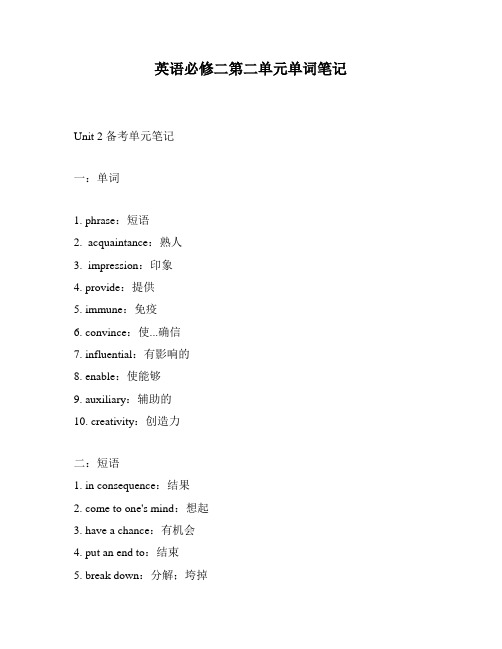
英语必修二第二单元单词笔记Unit 2 备考单元笔记一:单词1. phrase:短语2. acquaintance:熟人3. impression:印象4. provide:提供5. immune:免疫6. convince:使...确信7. influential:有影响的8. enable:使能够9. auxiliary:辅助的10. creativity:创造力二:短语1. in consequence:结果2. come to one's mind:想起3. have a chance:有机会4. put an end to:结束5. break down:分解;垮掉6. take over:接管7. do harm to:对...有害8. burst out:突然发起9. be wrapped in:包裹住10. refer to:提及三:语法1. would rather:宁愿2. It + be + adj. + for sb. to do sth.:对某人来说,做某事是...的3. come to + n.:结论;总的来说四:重点句型1. For example,...:例如,…2. Only in this way can we …:只有这样我们才能…3. There is no denying the fact that …:不可否认…4. Provided that …:只要…6. It is high time that …:是时候…了五:话题1. 同情被弃养的野生动物2. 印象主义的影响3. 自闭症融入社会4. 全球化对社会发展的影响5. 全球变暖如何应对六:综合运用Phrase可用来描述某种表达方式,例如“to be in consequence” 是一个常用的短语,它可以用来概括得出一个结论,即“事出有因”的意思。
Acquaintance指的是一个熟人,它可以使我们认识更多朋友,也可以构成我们的社交圈,从而锻炼我们的社交技能。
Unit2笔记人教版八年级上册英语

八年级上学期英语笔记(2)Unit 2 How often do you exercise?I. Important phrases.hardly ever 几乎从不swing dance 摇摆舞how often 多久一次once a week 每周一次twice a week 每周两次be full/free 忙的/有空surf/ use the Internet 上网How e?为什么? at least 至少,不少于at most 最多junk food 垃圾食品such as 例如more than 多于less than 少于stay up 熬夜help with sth帮助某事play sports 做运动on weekends 在周末go to the movies 看电影play puter games 玩电子游戏watch TV 看电视use the Internet 上网go to the dentist 去看牙医go shopping 去购物the most popular 最受欢迎的three times a month每月三次not......at all 一点也不have......lessons 上......课in one’s free time 在某人的空闲时间II. Grammar 频度副词1) 含义:一般用来表示动作发生的频率。
2) 一般来说可按频率大小排列为:(总是)always ﹥(通常) usually﹥(经常) often﹥(有时)sometimes﹥(几乎从不)hardly ever ﹥(从不) never3) 频度副词放在系动词、助动词或情态动词之后,行为动词之前。
eg. I never go shopping.4) 构成频率的表达方式:1. 次数(once/ twice/three times/...)+ a +时间(day/week/month/year/...)2. 次数+ every﹢基数词+时间eg. twice every three weeks once every two years3. every +时间(day,week, month, year...)4. 频度副词对以上四点提问时,一般用how often(多久一次)。
- 1、下载文档前请自行甄别文档内容的完整性,平台不提供额外的编辑、内容补充、找答案等附加服务。
- 2、"仅部分预览"的文档,不可在线预览部分如存在完整性等问题,可反馈申请退款(可完整预览的文档不适用该条件!)。
- 3、如文档侵犯您的权益,请联系客服反馈,我们会尽快为您处理(人工客服工作时间:9:00-18:30)。
Unit2笔记(朱迪整理)1.a tin of dog foodmany tins of dog foodHow many tins of dog food are there in the fridge?How much dog food is there in the fridge?2.There is no food. None 数量(how many/much)None of us/the studentsHow many students are there in the classroom?--NoneHow much water is there in the glass?—NoneWhat’s in the box? — Nothing.Who is in the classroom? — Nobody.3.order a pizzaorder(v.)(命令) sb.(DO) to do something(OC)4.go to school by undergroundT ake the underground to school5.little→less→least +[U]few→fewer→fewest +[C]s6.until延续性动词Y ou can shop until 10 o’clockEddie can sleep until 10 o’clockI will wait for you until 4 o’clock p.m.7.①teach sb.②teach you Beijing operateach sb. somethingteach them/us/him/her/me Mathematicsteach my father English(I)③teach sb. to do somethingCan teach me to swim?④teach sb. how to do somethingCan you teach me how to make cakes?8.It’s+time+from A to B +transportIt’s twenty minutes from my home to my school on foot.How long is it from my home to my school on foot?How far is it from my hone to my school on foot? It’s twenty minutes’ walk from my home tomy school.It’s +路程+ from A to B.It’s + distance + from A to B.It takes sb. time + to do something.It takes me twenty minutes to walkfrom…to….How long does it take me to walkfrom…to…?It’s three hours from Beijing to Shanghaiby plane/air.①How long is it from Beijing to Shanghaiby plane/air?②How far is it from Beijing to Shanghai byplane/air?It takes three hours to take a plane fromBeijing to Shanghai.It’s ten minutes from the centre of the cityto my home by bike.It’s ten minutes’ ride from the centre of thecity to my home.How far is it from the centre of the city tomy home?It takes me ten minutes to ride a bike fromthe centre of the city to my home.9.There be + more/least/fewer + n. + sp.than + sp.There is more land in Shanghai than inChangzhou.There are fewer people in Shanghai thanin Shanghai.There are fewer books in our library thanin their library.There is less water in the bottle than inthat bottle.10.most ①pron.不定代词most of usmost of the students/souvenirs②adj. +名词most buildingspron. Most of the water in the river isdirty.11.don’t have/need to do something=needn’t 不需要Y ou don’t have to take the umbrella with you.Y ou needn’t take the umbrella with you.Y ou needn’t cross the road to go to the post office.have to do something 客观He has to do so much work.Her son is ill/sick. She has to look after him.must 主观I want to get high works. I must work hard.Must I finish all the work now?--Y es, you must./No, you needn’t/don’t have to.12.(2)until 直到…为止①prep + timeMy mother always shops until 9:00 at night on Sundays.He works until eight o’clock in the office every day.I will stay here until noon.not…until 直到…才I can’t play basketball until five p.m. Sandy won’t arrive until 6:00.I didn’t go to bed until 10 last night.Eddie doesn’t do his homework until 7:00 yesterday evening.②conj.I will wait for you(主将)until you come here.(从现)They won’t go home until their parents take them home.They didn’t go home(主过) until they finished cleaning the class(从过).I can’t play outside until I finish my homework.13.look for findHe looked for a job, at least he found a well-paid job.14.A is + time + away from B + transport. It’s fifteen minutes away from my school by bus.My home is two kilometres away from my schoolHer dog Eddie is sick/ill.15.sick/illa sick dogan ill dog ill作定语,意思是品行不良的。
He has to see the doctor.16.不可数名词量表达①用much, a lot, of, lots of, some, a little 许多水much water 许多牛奶a lot of milk一些咖啡some coffee 一点果汁 a little juice②借助单位词一罐牛肉a tin of beef 一罐猪肉a can of pork一块面包a loaf of bread 一碗米饭a bowl of rice③量词与数词一致一瓶牛奶 a bottle of milk 两瓶牛奶two bottles of milk一袋盐a packet of salt 三袋盐three packets of salt17.something belong to sb.无进行时态The English book is Zhang Zheren’s.The English book belongs to Zhang Zheren.It is his book.The book is his.The ruler is Xue Yifan’s.The ruler belongs to Xue Y ifan.It is her ruler.The ruler is hers.I you he she it we theymy your his her its our theirmine yours his hers its ours theirs18.Lily shares a bedroom with her sister Lucy.This is Lily and Lucy’s bedroom.名词所有格①一般在名词词尾加’s或’,以s结尾的复数加’,不以s结尾的复数加’s,通常指有生命或者时间的名词所有格。
the teacher’s reading room today’s newspaper②如果表示某人或某物两人所共有,则在第二个人后面加’s.Lucy and Lily’s desk③表示无生命的词的所有关系用of(也能用于有生命名词的所有格)the windows of the house④一些用于表示距离、时间、国家或城镇等无生命的名词,也可以用’s表示所有格。
T en minutes’ drive China’s culture19.冠词a/the①a/an 用在可数名词前,表示某一种类的人或物,His father is a doctor.②表示个数,等于oneT om eats an apple every day.a one-month-old baby /w/an eight-year-old girl /ei/a useful experience /ju:/③表示某人或某物,但不具体说明A man is standing outside classroom.④固定词组a lot of, a little+[U], a few +[C], have a look 定冠词the①独一无二的the sun, the earth, the moon②the+ adj. 一类人the young/old/rich/poor③乐器前play the piano/violin④序数词和最高级前the best studentHe is always the first get to school.⑤专有名词前,习惯用法the Great Wall, the USA, the PRC, the UK, by the way⑥姓氏的复数前,表示一类人the Greens, the Wangs⑦上文提到过的人或物Lucy bought a new bike. The bike is red.⑧说话双方都知道的Open the door, please.20.life 生物[U]生命[C] their lives/ai/21.不用the①体育运动前play badminton②一日三餐前have breakfast/lunch③人名、地名、国家名称前in Changzhou a trip to Canada④季节、月份、星期前in Spring, in March, on Friday⑤节日前on Mother’s day at Mid-Autumn Festival⑥固定用法stay in bed in English go to bed come first⑦如果有our, my, some, any, this, that都不加theIt’s the first lesson in this term.It’s our first lesson in this term.22.something+ adj./elsesome other thing what else where elsesay to oneself23.leave vi./vt.①leave sp. 离开某地When will he leave Changzhou?②leave for sp. 动身去…When will he leave for Shanghai?③leave A for B 离开A地去B地When will he leave Changzhou for Shanghai?Go, come, leave 表示动作的短暂性动词,用现在进行时表示将来意义24.miss vt.+ somethingmiss early busthe trainThe exhibition is great. Don’t miss it.25.show sb. around sp.We will show the exchange students around our school.Can you show them around the museum?26.Main T ask 作文Changzhou is an old city. It is very tidy. There is less air pollution here than in other areas. There are lots of parks in Changzhou. They are all very beautiful. Changzhou is close to Shanghai. It is one hour from Changzhou to Shanghai by train. Y ou can buy different kinds of good souvenirs in Changzhou. Many foreigners come to visit Changzhou every year.。
